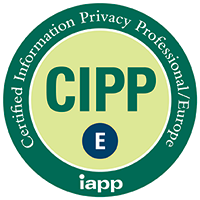CIPPE
Certified Information Privacy Professional/ Europe
- Description
- Course Learning Objectives
Course Description
Certified Information Privacy Professional/Europe (CIPP/E)
The global gold standard in European data protection certification.
This two-day training encompasses pan-European and national data protection laws, key data protection terminology and practical concepts concerning the protection of personal data and trans-border data flows.
The CIPP/E program was developed by the International Association of Privacy Professionals (IAPP), which is the world’s largest comprehensive global information privacy community and resource. The CIPP/E certification holds accreditation under ISO 17024: 2012.
Who should attend?
- Data Protection Officers
- Data Protection Lawyers
- Records Managers
- Information Officers
- Compliance Officers
- Human Resource Officers
- Anyone who uses, processes and maintains personal data
Are you GDPR Ready?
The General Data Protection Regulation (GDPR) takes effect in 2018, are you ready for it?
There’s a lot to know, there’s a lot at stake and there’s a lot of opportunity for data protection professionals with the right training and education.
Achieving a CIPP/E credential shows you have the comprehensive GDPR knowledge, perspective and understanding to ensure compliance and data protection success in Europe—and to take advantage of the career opportunity this sweeping legislation represents.
The Certified Information Privacy Manager (CIPM) credential provides the practical day-to-day information to lead an organisation’s data protection programme.
Adding the CIPM to your CIPP/E puts you at the forefront of ensuring your are ready for the GDPR.
Course Learning Objectives
What will you learn?
The program is broken into eleven modules:
Module 1: Data Protection Laws
Introduces key European data protection laws and regulatory bodies, describing the evolution toward a Harmonised European Legislative Framework.
Module 2: Personal Data
Defines and differentiates between types of data-including personal, anonymous, pseudo-anonymous and special categories.
Module 3: Controllers and Processors
Describes the roles and relationships of controllers and processors.
Module 4: Processing Personal Data
Defines data processing and GDPR processing principles, Explains the application of the GDPR and outlines the legitimate bases for processing personal data.
Module 5: Information provision
Explains controller obligations for providing information about data processing activities to data subjects and Supervisory Authorities.
Module 6: Data Subjects 'Rights
Describes data subjects' rights, applications of rights and obligations controller and processor.
Module 7: Security or Processing
Discusses considerations and duties of controllers and processors for Ensuring security of personal data and providing notification of data breaches.
Module 8: Accountability
Investigates accountability requirements, data protection management systems, data protection impact assessments, privacy policies and the role of the data protection officer.
Module 9: International Data Transfers
Outlines options and obligations for transferring data outside the European Economic Area, Decisions adequacy and appropriateness safeguards and derogations.
Module 10: Super Visions and Enforcement
Describes the role, powers and procedures or Supervisory Authorities; the composition and tasks of the European Data Protection Board; the role of the European Data Protection Supervisor; and remedies, liabilities and penalties for non-compliance.
Module 11: Compliance
Discusses the applications of European data protection law, legal bases and compliance requirements for processing personal data in practice, employers-including processing employee data, surveillance, direct marketing, Internet technology and communications and outsourcing.